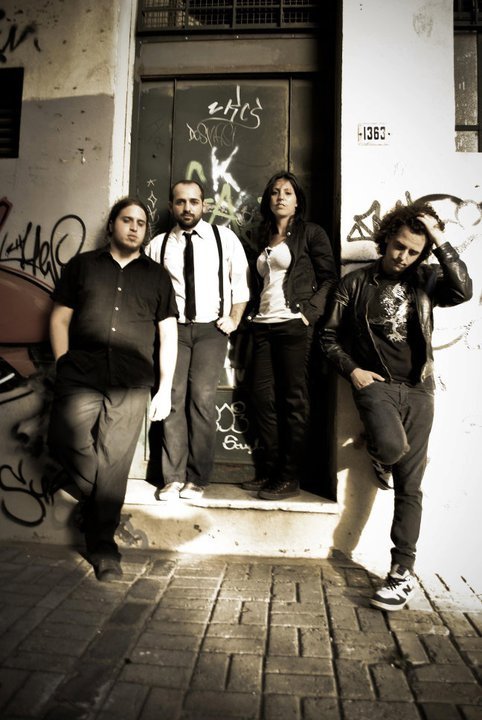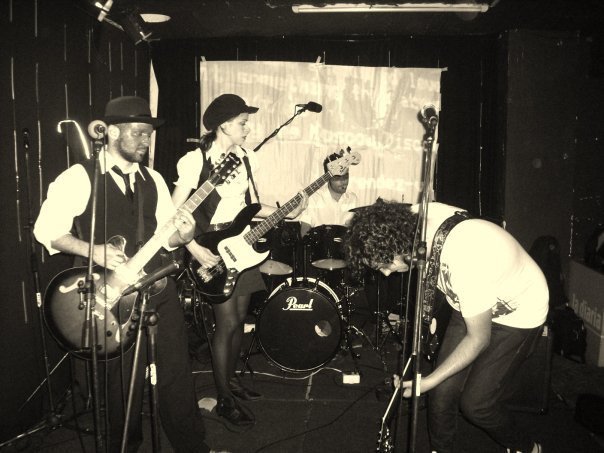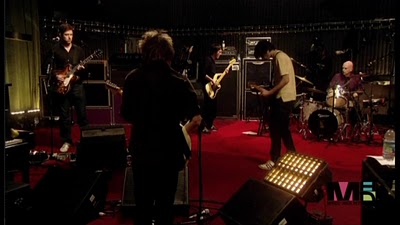
The Blueberries Are Ernesto Pasarisa, Virginia Álvarez, Fede Hell And Santiago Jaureguy
In one of the poems he wrote during the final phase of his literary career, W.B. Yeats defined the inspiration which drives artists as the appetite for the apple in the bough that is the furthest away from reach. I find no better allegory for the musical vision of the many Uruguayans who hold both British and American performers as ultimate role models. The difficulties they have to face the moment they decide to make music in English in what is a Spanish-speaking country are tantalizing, including a coma-inducing lack of airplay and a barrage of misconceptions regarding what they really want to do. Onlookers claim that they are selling out, that they have no respect for Uruguayan culture, that they are posh bastards… nobody minces words. They are called all kinds of things.
There is one thing they are seldom called, though.
They are not called people with the ability to cast their aspirations beyond the logical barriers of the context they live in, and with the endurance to follow such aspirations wherever they might take them, and whichever obstacles they might end up facing. Which I think we have to agree is the truest sign of strength – the person who falls and picks himself up constantly is by far stronger than the one who never falls down.
I have already covered many artists who have chosen to sign in English in this country. Having written in English my whole life (and having gone as far as to publish a book of lyric poetry in English in Uruguay, no less) I’m naturally interested in what they do. If you read the blog frequently, you know the reviews I write about such bands usually revolve around the same set of considerations – while I profess a larger or lesser sympathy for what they do, I also tend to have reservations about how they do it. Sometimes I criticize their over-reliance on specific bands (to the point they end up sounding like cheap imitators), and other times the lyrics make me just disgruntle owing to the grammar violations and disregard for British/American naturalness they evidence. But I mainly end up the coverage of such artists remarking how much I appreciate what they intend to do, which is nothing short of an Herculean task: making people understand that one will go as far as his ability to dream and stand for these dreams can go, that only then can monotony be overtaken. Notwithstanding which shortcomings I might (or not) perceive, I always conclude that these bands are transcendental simply because of the motivational role they do play for people who have the certainty there’s something more to life than what the eye can see.
The Blueberries is a band that certainly does. Led by Ernesto Pasarisa (who sings, plays guitar and composes the songs performed by the band), they became publicly-known when they were nominated for a Graffiti Award for “Best Alternative Pop Album” just a couple of months ago. But the story of the band actually went a long way back, more precisely to the year 2007 when it was founded by Ernesto and some good friends to keep the music and essence of artists like The Velvet Underground, Bob Dylan, The Beatles, The Who, The Kinks, The Hives, The Libertines, The Strokes, The Moldy Peaches, Oasis and Blur well alive. Over the course of the years, they settled on their actual line-up which comprises Ernesto on lead vocals and guitar, Santiago “Saji” Jaureguy on guitar and backing vocals, Virginia Álvarez on bass and Fede Hell on drums. An indie band at heart, The Blueberries recorded a self-titled album that they chose to make available as a free download on their own site. It was produced by Max Capote, and mastered by Juan Branaa.

An Earlier Line-up Of The Blueberries Playing Live
As regards the way in which the band chose to market their music, this is what Saji recently told a Uruguayan portal:
“The dream of many an artist is to see his album on the racks of stores, and to be supported by a record company which has contacts along with logistic and marketing resources. That sounds quite tempting, but the truth is there are very few people willing to make an investment on emerging artists. Right now, everything revolves around placing an album in a rack and little else. If the album is successful, you will become best friends with the owner of the record company, and he will take your calls. If not (and that is something lots of bands we know can attest to) you will be moved down the pecking order, and nobody will lift a finger for you. And the thing is, few are willing to take a risk – the cost of recording an album is on the artist/band, and so is the cost of pressing it. Yet, the label is the one taking up to 80 % of what is earned just by placing it on a store.”
Thus, the band chose to make their debut album freely available to whomever wished to get it. And Ernesto wrote about 200 personalized emails introducing the band to radio stations, bloggers and the press. That’s how I became acquainted with their music. Continue reading →









